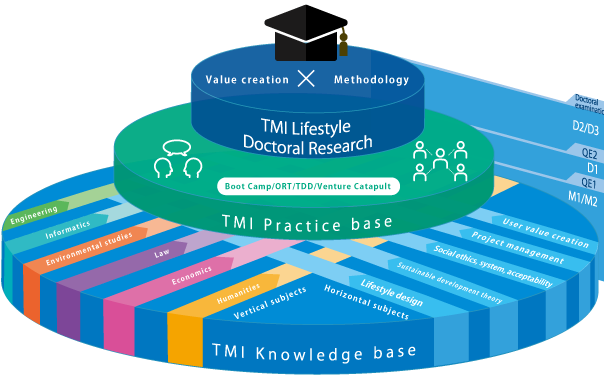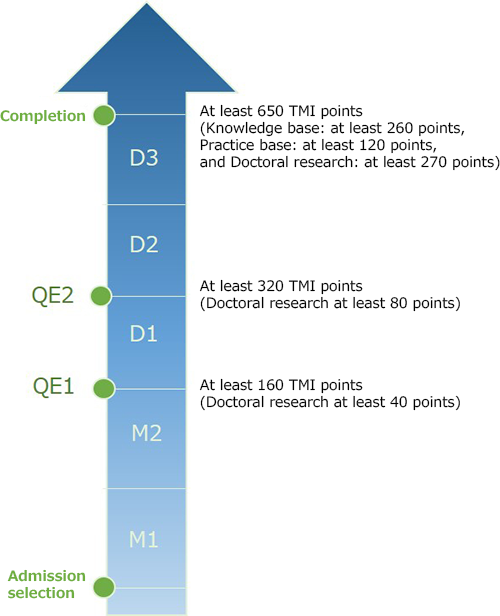Three-layered curriculum
The transdisciplinary curriculum is structured in three layers (TMI Knowledge Base, TMI Practice Base, and TMI Lifestyle Revolution Doctoral Research) to acquire the necessary knowledge and practicum experience for TMI. In the TMI Knowledge Base, students acquire the necessary knowledge and practicum experience for TMI by selecting what to learn according to their background. It is structured into 1) Coursework, 2) Transdisciplinary Faculty Discussion Lectures, and 3) Mobility Innovation Common Lectures. In Coursework, students acquire fundamental knowledge for transdisciplinary collaborations through vertical subjects to study specialization and horizontal subjects to link different fields. In Transdisciplinary Faculty Discussion Lectures, faculty members in various fields provide opportunities to learn different perspectives. In Mobility Innovation Common Lectures, students learn basic knowledge related to mobility.
The TMI Practice Base consists of 1) Boot Camps, 2) Onsite Research Training (ORT), 3) Testbed Design and Development (TDD), and 4) Venture Catapult. Boot Camps build transdisciplinary collaborations in a team setting at overnight camps. In ORTs, students conduct onsite survey research at different locations such as at municipal governments. TDD provide students opportunities to design and develop a testbed as a basis for demonstration experiments in and outside the University in collaboration with corporate mentors, while Venture Catapult allows students to work together to plan and establish a venture company.
In TMI Lifestyle Revolution Doctoral Research, students conduct doctoral dissertation research with an emphasis on value creation and methodology in the lifestyle revolution. Research is based on transdisciplinary collaborations such as industry-academia co-creation, leveraging the students’ specialization. In particular, the program fosters abilities to become Knowledge Professionals through collaborative research with private corporations in Industry-Academia Co-Creation Education promoted by the University.
Cultivating knowledge and practical experiences in different fields from the mobility innovation viewpoint.

Program completion requirements
TMI provides an attractive curriculum for students while maintaining a moderate workload. Unique TMI points are assigned to each layer to measure progress towards the completion requirements.
TMI curriculum completion point requirements
- Students must accumulate at least 650 points:
1-1 TMI Knowledge Base: minimum of 260 points
1-2 TMI Practice Base: minimum of 120 points
1-3 TMI Lifestyle Doctoral Research: minimum of 270 points - At QE1, students must earn at least 160 points (including at least 40 points in doctoral research).
- At QE2, students must earn at least 320 points (including at least 80 points in doctoral research).


